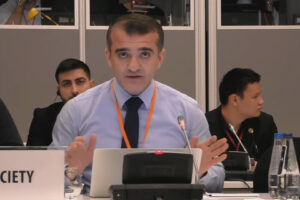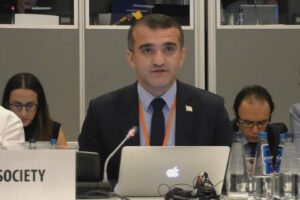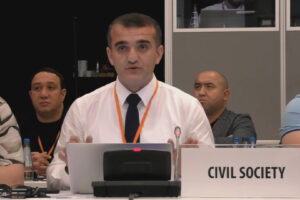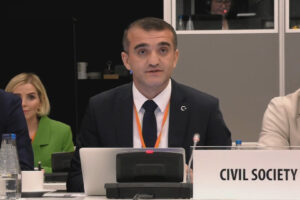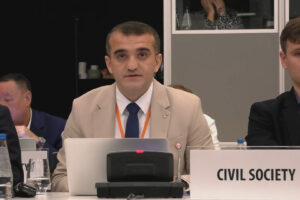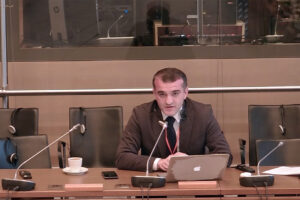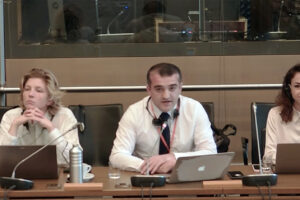Intigam Aliyev continues advocacy in jail

The lawyer Anar Gasymly visited the human rights defender Intigam Aliyev in Baku Prison N1 on September 6. However wardens again censored the records prepared by the human rights activist for the lawyer. Turan was told by Aliyev’s relatives.
In particular, they prohibited the transfer of an appeal to the leadership of the detention center and the Prison Service.
This appeal, in particular, spoke of illegal restrictions imposed on the correspondence of prisoners, letters of support coming to them and the transfer of literature.
In addition, it was stated on the gross suppression of the prisoners’ right to say hello to each other in a room for meetings with lawyers.
At the same time, it pointed out the poor conditions in the cells and in particular the lighting switched on for 24 hours a day, lack of refrigeration and heating equipment to maintain the normal state of food sent from home and the products purchased at kiosks in the jail.
Complaints are also caused by unethical treatment of people bringing food and medicines to prisoners, filing them illegal demands, more serious test of lawyers compared to prosecutors, the removal of flash cards from the lawyers, which contain information about their clients.
It was assumed that the treatment would be signed Aliyev himself and his lawyer.
However the wardens reading the appeal stated that since the text refers to the institution, then it should be read by the management.
Despite the objections of Aliyev and the counsel that a prisoner’s correspondence with the defenders, including their declarations and appeals cannot be censored, the appeal was taken to the authorities.
Later, Aliyev was told that the appeal may be brought only by the very jail.
The lawyer Gasymly regarded the incident as a violation of the rights of Aliyev and his own rights as a defender.
According to him, in accordance with Article 17.3 of the Law “On the rights and freedoms of persons held in custody,” prisoners’ correspondence with the lawyer is assigned to exceptions of cases when they can be taken to limit the receipt or sending letters to prisoners.
In particular, the law allows such restrictions and the use of censorship to suppress the upcoming crime and to ensure the safety of persons involved in criminal prosecution, and others. Moreover, the decision on restriction must be justified and may be appealed to higher authorities or court. However, in any case, the restrictions do not apply to a prisoner’s correspondence with his lawyer.
And Article 18 of the same law states that prisoners’ applications, proposals, statements and complaints to the investigator or the prosecutor in charge of the supervision procedure, to the court, the authority supervising the detention facilities, the Ombudsman, the European Court of Human Rights, or the European Committee against Torture shall be promptly sent to the recipients.
Responses to these requests are not censored. Prisoners cannot be persecuted for sending applications and complaints. Persons who have committed such prosecution shall be held liable for it.
Aliyev said that the arrests of activists in the recent years are aimed at ruling Azerbaijan as a feudal state.
However, in his view, the arrests should not intimidate society.
In his view, the obstacles in front of the arrested activists to even say hello to each other are a measure of fear of the authorities.
“Those who expect arrests to intimidate society are wrong. Perhaps in the society it creates some confusion, but they cannot completely suppress the dignity of people,” said Aliyev.
Our attempts to get comments from the Prison Service have not yet succeeded.
Intigam Aliyev continues advocacy in jail
 09 September 2014
09 September 2014
The lawyer Anar Gasymly visited the human rights defender Intigam Aliyev in Baku Prison N1 on September 6. However wardens again censored the records prepared by the human rights activist for the lawyer. Turan was told by Aliyev’s relatives.
In particular, they prohibited the transfer of an appeal to the leadership of the detention center and the Prison Service.
This appeal, in particular, spoke of illegal restrictions imposed on the correspondence of prisoners, letters of support coming to them and the transfer of literature.
In addition, it was stated on the gross suppression of the prisoners’ right to say hello to each other in a room for meetings with lawyers.
At the same time, it pointed out the poor conditions in the cells and in particular the lighting switched on for 24 hours a day, lack of refrigeration and heating equipment to maintain the normal state of food sent from home and the products purchased at kiosks in the jail.
Complaints are also caused by unethical treatment of people bringing food and medicines to prisoners, filing them illegal demands, more serious test of lawyers compared to prosecutors, the removal of flash cards from the lawyers, which contain information about their clients.
It was assumed that the treatment would be signed Aliyev himself and his lawyer.
However the wardens reading the appeal stated that since the text refers to the institution, then it should be read by the management.
Despite the objections of Aliyev and the counsel that a prisoner’s correspondence with the defenders, including their declarations and appeals cannot be censored, the appeal was taken to the authorities.
Later, Aliyev was told that the appeal may be brought only by the very jail.
The lawyer Gasymly regarded the incident as a violation of the rights of Aliyev and his own rights as a defender.
According to him, in accordance with Article 17.3 of the Law “On the rights and freedoms of persons held in custody,” prisoners’ correspondence with the lawyer is assigned to exceptions of cases when they can be taken to limit the receipt or sending letters to prisoners.
In particular, the law allows such restrictions and the use of censorship to suppress the upcoming crime and to ensure the safety of persons involved in criminal prosecution, and others. Moreover, the decision on restriction must be justified and may be appealed to higher authorities or court. However, in any case, the restrictions do not apply to a prisoner’s correspondence with his lawyer.
And Article 18 of the same law states that prisoners’ applications, proposals, statements and complaints to the investigator or the prosecutor in charge of the supervision procedure, to the court, the authority supervising the detention facilities, the Ombudsman, the European Court of Human Rights, or the European Committee against Torture shall be promptly sent to the recipients.
Responses to these requests are not censored. Prisoners cannot be persecuted for sending applications and complaints. Persons who have committed such prosecution shall be held liable for it.
Aliyev said that the arrests of activists in the recent years are aimed at ruling Azerbaijan as a feudal state.
However, in his view, the arrests should not intimidate society.
In his view, the obstacles in front of the arrested activists to even say hello to each other are a measure of fear of the authorities.
“Those who expect arrests to intimidate society are wrong. Perhaps in the society it creates some confusion, but they cannot completely suppress the dignity of people,” said Aliyev.
Our attempts to get comments from the Prison Service have not yet succeeded.
 @
@










